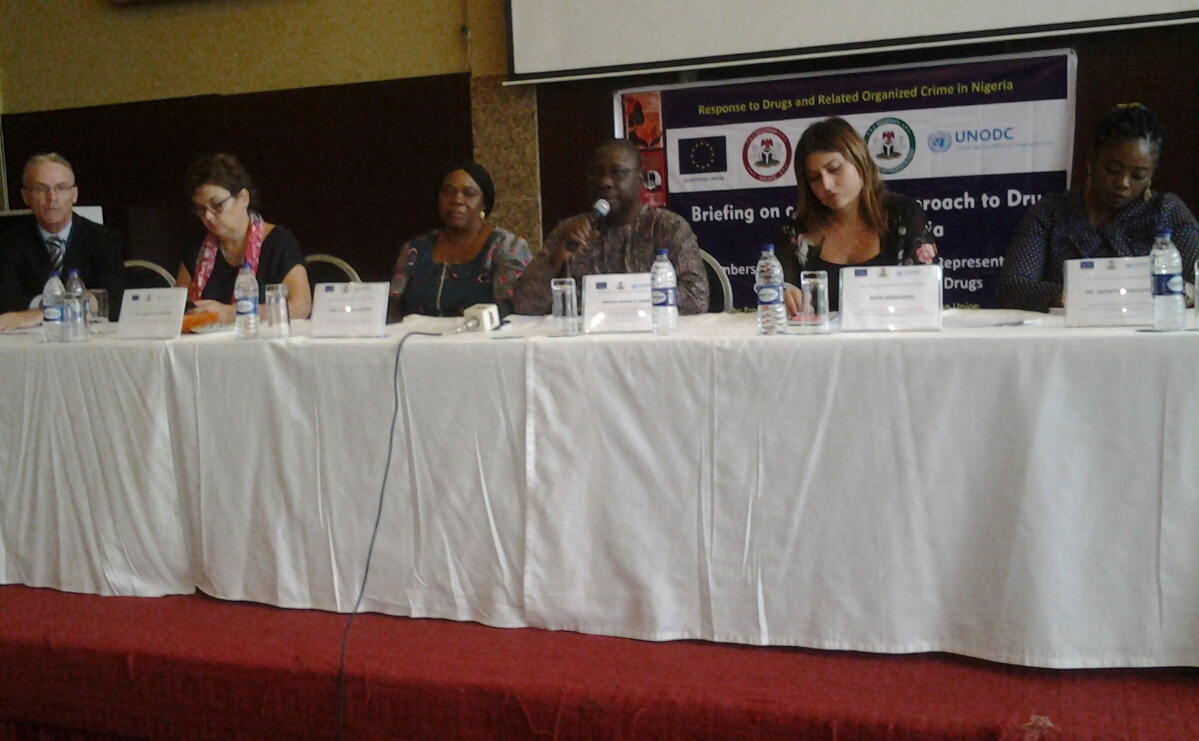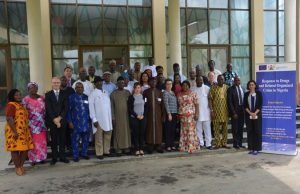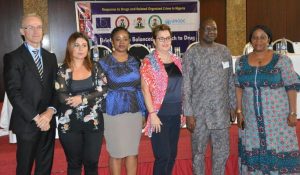Law makers opt for balanced approach responses to drug control


Members of the Senate and House committees of the National Assembly on Narcotics and Drugs have restated their commitment and resolve to strengthen Nigeria’s response to drugs and related organised crime in line with international conventions.
Rising from a 3-day meeting on “Balanced, Evidence-Based and Human Rights-Based Drug Control in line with 3 UN Drug Control the Conventions” on Friday July 13 at Uyo, the Chairman, Senate Committee on narcotics and Drugs, Senator Josuha Lidani, joined by his counterpart in the House of Representatives, Hon. Eucharia Azodo along with a representative of the Ministry of Budget and National Planning Ms Aishatu Abdullahi, European Union representative, Ms Eleni Zerzelidou, UNODC Representative in Nigeria, Ms Christina Albertin and UNODC Project Coordinator, Response to drugs and related organised crime, Mr. Glen Prichard addressed a press conference pledging to intensify actioms towards drug responses as stipulated in the National Drug Control Master Plan (NDCMP) 2015-2019.
Senator Lidani said the two committee of the national assembly had identified three priority areas in the NDCMP which the law makers would address: Drug law enforcement, drug demand reduction and availability and control of narcotics and psychotropic substances.
To enforce the nation’s drug laws, he announced that the national assembly would work towards strengthening the National Drug Law enforcement Agency (NDLEA) and raise the agency’s profile.
“NDLEA should increase their advocacy through print media, social media, electronic and a functional website,” he said.
He added that NDLEA would be enabled to investigate drug trafficking and related crimes tbat involve money laundering.
Senator Lidani also listed three key areas where the law makers would work to ensure drug demand reduction. These include:
● Sensitisation, awareness, education on drug issues, especially to community, families, professionals, government, religious leaders, traditional leaders, internally displayed populations (IDPs)
● Continuous professional training at treatment centres for drug counsellors, social workers, doctors, nurses and other professional staff.
● Expanding treatment through establishing and maintaining treatment centres with a focus on drop-in centres, community-based treatment provision of continuity of care (detox, counselling, rehabilitation, vocational training), women’s specific centres, centres for IDPs and provision of vocational training.
The senator also informed that the law makers would work towards the control and availability of narcotics and psychotropic substances by ensuring that regular and adequate supply of appropriate and recommended opioid medicines are available in the country.
He pledged that the assembly would regulate the required and recommended psychotropic substances and precursor while also standardising formulations of controlled drugs for Nigeria.
“The committees will continue to engage with various ministries and technical agencies of the Government of Nigeria, discuss with Senate and House of Representatives Committee on Health, the Ministry of Health, the Ministry of Budget and National Planning, the European Union as well as the United Nations Office for Drugs and Crime to take forward Nigeria’s response on drug control,” Senator Lidani further pledged.
The event was organised by the UNODC as part of its ‘Response to Drugs and Related Organised Crime in Nigeria’, a project funded by the European Union (EU). According to Mr. Prichard, the project which commenced in 2013 and
scheduled to conclude at the end of 2019 is aimed at assisting the the Nigerian government in its efforts in fighting drug production, trafficking and use and towards improved access to quality drug prevention, treatment and care services in the country.
The project has, since inception, recorded some notable achievements which include:
● Completion of data collection in 2017 for Nigeria’s first national drug use survey report expected to be finalised by the end of the year;
● Support to the development and implementation of the National Drug Control master Plan 2015 -2019;
● Institutional assessment of NDLEA and support for change management programme to drive agency from reactive to an intelligence-led agency;
● Development of an intelligence model for NDLEA;
● Delivery of 83 law enforcement courses to 1, 755 law enforcement from 7 different agencies;
● Development of information Education and Communication materials to reinforce the human rights and rule of law is applied to persons in detention;
● Provision of critical operational assets, including 10 vehicles to NDLEA and 1 to NAFDAC;
● Support the first ever national scientific and analysis of data to quantify the needs of narcotics and estimate the need of psychotropic substances and precursors for medical and scientific purposes for completion in early 2017;
● Development of National Policy for Controlled Medicines;
● Training on drug treatment and counselling provided to 1, 717 health practitioners and drug counsellors;
● Support the development of National Minimum Standards for Drug Dependence treatment in Nigeria as well as national policy guidelines for drug counselling by NDLEA;
● Support the piloting of a system to routinely collect drug treatment data called the Nigerian Epidemiological Network on Drug Use (NENDU), including the completion of reports in 2015 and 2016;
● Establishment of 11 model drug treatment centres and 6 regional drug treatment training hubs, including the provision of equipment;
● Course on sensitisation on drug treatment and human rights of drug users designed and 7 courses delivered to 176 NDLEA officers, including NDLEA commanders;
● Development of Information, Education and Co6mmunication for drug sensitisation activities;
● Support the establishment of a network of Civil Society Organisations (CSOs) working on drug pprevention, treatment and awareness matters and
● Successfully undertook a randomised control trial for a drug prevention programme in Nigeria for the first time in Africa.

